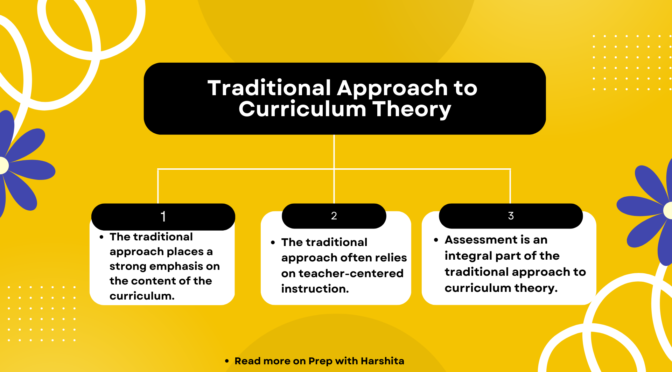The traditional approach to curriculum theory is based on the idea that the curriculum should be designed based on specific knowledge which is important for students to learn.
This approach focuses on the development of predetermined subject matter. This is designed to deliver this content in a structured and systematic way.
This approach often starts with the development of objectives that define the expected outcomes of the curriculum. These objectives are usually based on the needs of society, the learners, and the educational institutions. Once the objectives are identified, the curriculum developers design the content and instructional methods that will best achieve these objectives.
The traditional approach to curriculum theory is characterized by several key features:
- Emphasis on the subject matter: The traditional approach places a strong emphasis on the content of the curriculum. The goal is to ensure that students learn specific knowledge and skills that are considered essential for their future success.
- Prescriptive objectives: This approach often starts with the development of predetermined objectives that define the expected outcomes of the curriculum. These objectives are usually based on the needs of society, the learners, and the educational institutions.
- Structured and systematic delivery: The curriculum is designed to deliver the content in a structured and systematic way. The goal is that all students receive the same instruction and have the opportunity to learn the same material.
- Teacher-centered instruction: This approachrelies on teacher-centered instruction, where the teacher is seen as the primary source of knowledge .
- Assessment of learning outcomes: Assessment is an integral part of the traditional approach to curriculum theory. It is used to measure whether students have achieved the desired learning outcomes and to provide feedback to teachers and learners.
- Standardization: The traditional approach often leads to standardized curricula that are used across different schools and educational systems. This helps to ensure that all students are exposed to the same content and have the opportunity to learn the same material.
Traditional approach has also been criticized for being too rigid and inflexible. Critics argue that it does not take into account the individual needs and interests of students and can lead to a one-size-fits-all approach to education.
Also read : Curriculum as Product



Thanks for sharing. I read many of your blog posts, cool, your blog is very good.